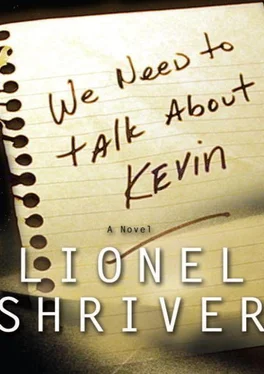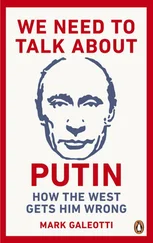“What about all that Armenian shit?” asked Kevin, cutting his eyes toward me flintily. “ Oh, no, like, a million years ago the Turks were big meanies and now nobody cares! That’s not self-pity?”
“I’d hardly put genocide on a par with being jilted,” I snapped.
“Nyeh nyeh -nyeh nyeh NYEH-nyeh-nyeh nyeh-nyeh nyeh nyeh nyeh-nyeh NYEE-nyeeh!” Kevin mocked under his breath. “Jesus, give it a rest.”
“—And what’s this about wanting to kill all the girls who’d ever broken up with him ?” I jeered.
“Could you shut up ?” said Kevin.
“Kevin!” you scolded.
“Well, I’m trying to follow this, and she said she wanted to watch the news.” Kevin often spoke of his mother as I spoke of Americans. We both preferred the third person.
“But the brat’s eleven years old!” I hated people who talked over the news, too, but I couldn’t contain myself. “How many girlfriends can that be?”
“On average?” said our resident expert. “About twenty.”
“Why,” I said, “how many have you had?”
“Ze-ro.” Kevin was now so slumped as to be nearly supine, and his voice had a gravelly creakiness that he would soon employ all the time. “Hump ’em and dump ’em.”
“Whoa, Casanova!” you said. “This is what we get for telling a kid the facts of life at seven.”
“Mommy, who are Humpum and Dumpum? Are they like Tweedledum and Tweedledee?”
“Celia, sweetheart,” I said to our six-year-old, whose sexual education did not seem so urgent. “Wouldn’t you like to go play in the playroom? We’re watching the news, and it’s not much fun for you.”
“Twenty-seven bullets, sixteen hits,” Kevin calculated appreciatively. “Moving targets, too. You know, for little kids that’s a decent percentage.”
“No, I want to stay with you!” said Celia. “You’re my friennnd!”
“But I want a picture, Celia. You haven’t drawn me a picture all day!”
“Oh-kay.” She lingered, fisting her skirt.
“Here, first give me a hug, then.” I drew her to me, and she threw her arms about me. I wouldn’t have thought a six-year-old could squeeze so hard, and it was painful to have to pry her fingers from my clothing when she wouldn’t let go. Once she had shuffled out of the room, after pausing in the archway and waving with a cupped hand, I caught you rolling your eyes at Kevin.
In the meantime, a reporter on screen was interviewing Andrew Golden’s grandfather, from whom some of the kids’ stockpile of weapons had been stolen, including three high-powered rifles, four pistols, and a trove of ammunition. “It’s a terrible tragedy,” he said unsteadily. “We’ve lost. They’ve lost. Everybody’s lives are ruined.”
“You can say that again,” I said. “I mean, what was ever going to happen but they’d be nabbed and nailed and put away for eternity? What were they thinking?”
“They weren’t thinking,” you said.
“You kidding?” said Kevin. “This stuff takes planning. ’Course they were thinking. Probably never thought harder in their whole crummy lives.” From their first occurrence, Kevin owned these incidents, and whenever the subject arose he assumed an air of authority that got on my nerves.
“They weren’t thinking about what comes next,” I said. “They may have thought out their stupid attack, but not the next five minutes—much less the next fifty years.”
“Wouldn’t be so sure,” said Kevin, reaching for a handful of nacho tortilla chips with glow-in-the-dark cheese. “You weren’t listening—as usual—cause Celie had to have her huggy-wuggies. They’re under fourteen. According to the law in Arkansas, Batman and Robin there’ll be back in the Batmobile by eighteen.”
“That’s outrageous!”
“Records sealed, too. Bet everybody in Jonesboro’s really lookin’ forward to it.”
“But you can’t seriously imagine that they took a trip to the law library beforehand and checked out the statute books.”
“Mm,” Kevin hummed noncommittally. “How do you know? Anyway, maybe it’s dumb to think about the future all the time. Put off the present long enough and it, like, never happens, know what I’m sayin’?”
“They have lower sentences for juveniles for good reason,” you said. “Those kids had no idea what they were doing.”
“You don’t think so,” said Kevin caustically. (If he was offended by my ridicule of adolescent angst, our son may have been more affronted by your compassion.)
“No eleven-year-old has any real grasp of death,” you said. “He doesn’t have any real concept of other people—that they feel pain, even that they exist. And his own adult future isn’t real to him, either. Makes it that much easier to throw it away.”
“Maybe his future is real to him,” said Kevin. “Maybe that’s the problem.”
“Come on, Kev,” you said. “All the kids in these shootings have been middle class, not guys from some urban sewer. Those boys were looking at a life with a mortgage and a car and a job in management, with yearly holidays to Bali or something.”
“Yeah,” Kevin purred. “Like I said.”
“You know what?” I said. “Who cares. Who cares whether shooting people is or isn’t real to them, and who cares about their painful bust-ups with girlfriends that don’t even have tits yet. Who cares. The problem is guns. Guns, Franklin. If guns weren’t kicking around these people’s houses like broom handles, none of these—”
“Oh God, here we go again,” you said.
“You heard Jim Lehrer say that in Arkansas it isn’t even illegal for minors to possess firearms?”
“They stole them—”
“They were there to steal. And both boys owned rifles of their own. It’s absurd. No guns, and those two creeps go kick a cat, or— your idea of how to solve differences—go punch their ex-girlfriends in the face. Bloody nose; everybody goes home. These shootings are so inane that I’d think you’d be grateful to find some little turd of a lesson in them.”
“Okay, I can see restricting automatic weapons,” you said, getting that preachy sound that for me was the bane of parenthood. “But guns are here to stay. They’re a big part of this country, target shooting and hunting, not to mention self-defense—.” You stopped because I had obviously stopped listening.
“The answer, if there is one, is the parents ,” you resumed, now ranging the room and raising your voice above the TV, from which Monica Lewinsky’s big fat lovelorn face was once more ogling. “You can bet your bottom dollar those boys had no one to turn to. No one they could really pour their hearts out to, who they could trust. When you love your kids, and you’re there for them, and you take them on trips, like to museums and battlefields, and make time for them, you have faith in them and express an interest in what they think? That’s when this kind of plunging off the deep end doesn’t happen. And if you don’t believe me, ask Kevin .”
But for once Kevin wore his derision on his sleeve. “Yeah, Dad ! It makes a real big difference to me that I can tell you and Mumsey anything, especially when I’m under all this peer pressure and junk! You always ask what video games I’m playing or what my homework is, and I always know I can turn to you in times of need !”
“Yeah, well, if you couldn’t turn to us, buster,” you grumbled, “you wouldn’t think it was so damned funny.”
Celia had just crept back to the den’s archway, where she hung back, fluttering a piece of paper. I had to motion her inside. She’d always seemed undefended, but this cringing, Tiny Tim meekness of hers was new, and I hoped it was only a phase. After resealing the edges of her Opticlude bandage, I pulled her into my lap to admire her picture. It was discouraging. Dr. Sahatjian’s white coat was drawn so large that his head was off the page; the self-portrait of Celia herself rose only to the oculist’s knee. Although her drawings were usually light, deft, and meticulous, in the place where her left eye should have been, she’s crayoned a formless scribble that violated the outline of her cheek.
Читать дальше












